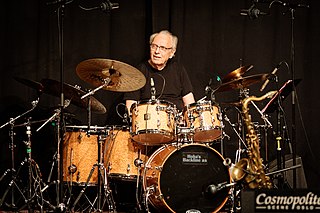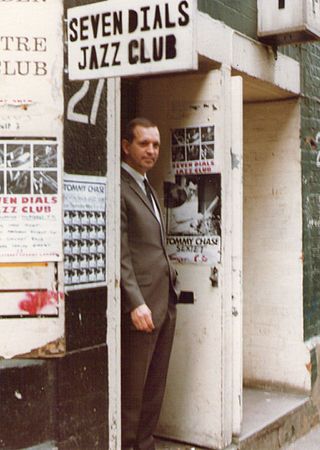
Soft Machine are a British rock band from Canterbury formed in mid-1966 by Mike Ratledge, Robert Wyatt, Kevin Ayers, Daevid Allen and Larry Nowlin. As a central band of the Canterbury scene, the group became one of the first British psychedelic acts and later moved into progressive and jazz rock, becoming a purely instrumental band in 1971. The band has undergone many line-up changes, with musicians such as Andy Summers, Hugh Hopper, Elton Dean, John Marshall, Karl Jenkins, Roy Babbington and Allan Holdsworth being members during the band's history. The current line-up consists of John Etheridge, Theo Travis, Fred Thelonious Baker and Asaf Sirkis.

Robert Wyatt is a retired English musician. A founding member of the influential Canterbury scene bands Soft Machine and Matching Mole, he was initially a kit drummer and singer before becoming paraplegic following an accidental fall from a window in 1973, which led him to abandon band work, explore other instruments, and begin a forty-year solo career.
Matching Mole were an English progressive rock band associated with the Canterbury scene. Robert Wyatt formed the band in October 1971 after he left Soft Machine and recorded his first solo album, The End of an Ear. He continued his role on vocals and drums and was joined by David Sinclair of Caravan on organ and piano, Dave MacRae on electric piano, Phil Miller of Delivery on guitar and Bill MacCormick of Quiet Sun on bass. The name is a pun on Machine Molle, the French translation of the name of Wyatt's previous group Soft Machine.

Hugh Colin Hopper was a British progressive rock and jazz fusion bass guitarist. He was a prominent member of the Canterbury scene, as a member of Soft Machine and other bands.

Third is a live and studio album by the English rock band Soft Machine, released as their third overall in June 1970 by CBS Records. It is a double album with a single composition on each of the four sides, and was the first of two albums recorded with a four-piece line-up of keyboardist Mike Ratledge, drummer and vocalist Robert Wyatt, saxophonist Elton Dean, and bass guitarist Hugh Hopper. Third marks a shift in the group's sound from their psychedelic origins towards jazz rock and electronic music.

Elton Dean was an English jazz musician who performed on alto saxophone, saxello and occasionally keyboards. Part of the Canterbury scene, he featured in Soft Machine, among others.

The Wilde Flowers were an English psychedelic rock band from Canterbury, Kent. Formed in 1964, the group originally featured lead vocalist Kevin Ayers, lead guitarist and co-lead vocalist Brian Hopper, rhythm guitarist and vocalist Richard Sinclair, bassist Hugh Hopper and drummer Robert Wyatt. Despite not releasing any material during their brief three-year tenure, the band are generally considered to be the originators of the Canterbury scene. After their breakup in 1969, the group's members went on to form numerous key bands within the scene, including Soft Machine, Caravan and Camel.
William MacCormick is an English bassist and vocalist. He is also a politician and author.

The End of an Ear is the debut solo album by Soft Machine's Robert Wyatt.

Fifth, is the fifth studio album by the jazz rock band Soft Machine, released in 1972. In the US the album was identified on cover and label by number (5).

John Stanley Marshall was an English drummer and founding member of the jazz rock band Nucleus. From 1972 to 1978, he was the drummer for Soft Machine, replacing Phil Howard when he joined.

Roy Babbington is an English rock and jazz bassist. He became well known for being a member of the Canterbury scene progressive rock band Soft Machine.
Delivery was a British blues/progressive rock musical group, formed in the late 1960s. The band was one of the wellsprings of the progressive rock Canterbury scene.

Gary Husband is an English jazz and rock drummer, pianist, keyboard player and bandleader. He is also a composer, arranger and producer.

John Michael Glyn Etheridge is an English jazz fusion guitarist, composer, bandleader and educator known for his eclecticism and broad range of associations in jazz, classical, and contemporary music. He is best known for his work with Soft Machine from 1975 to 1978, 1984 and 2004 to present.
David Scott MacRae is a New Zealand keyboardist, noted for his contributions in jazz and jazz rock, and his collaborations with musicians from the Canterbury scene.

Neville Whitehead is a New Zealand bassist and luthier who was an active member of the British jazz fusion community in the 1970s.

The Seven Dials Jazz Club opened its doors in 1980 as a venue for live music in Covent Garden, London. It hosted a range of artists and styles of jazz and began to attract a regular audience. Starting in 1983, a series of saxophone festivals was held on the premises each year.
Romantic Warriors III: Canterbury Tales (2015) is the third in a series of feature-length documentaries about Progressive rock written and directed by Adele Schmidt and José Zegarra Holder. This one focuses on the music of the Canterbury scene.













